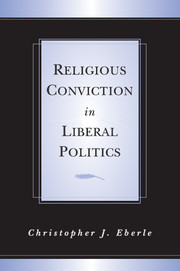Book contents
7 - Populist Conceptions of Public Justification
Published online by Cambridge University Press: 18 December 2009
Summary
INTRODUCTION
Recall the distinction between a rational justification and a public justification. As I noted (3.2.1), rational justification is a function, in crucial part, of evidential set: whether Elijah is rationally justified in assenting to p is a function, in crucial part, of the evidence Elijah has to go on, of the other beliefs and experiences Elijah brings to bear in determining whether p merits his assent. But the dependence of rational justification on evidential set has the following implication: Elijah can be rationally justified in assenting to p even if none of his compatriots are rationally justified in assenting to p. Indeed, since Elijah's compatriots no doubt have very different evidential sets, Elijah's compatriots might very well be rationally justified in finding p completely unacceptable.
The unavoidably perspectival or person-relative nature of rational justification opens up space for the concept of public justification: if a rational justification is a rationale a citizen regards as providing adequate support for a certain coercive law given her distinctive evidential set, a public justification is a rationale other people regard as providing adequate support for that law given their respective evidential sets. If we define “the public” as the set of “other people” who must find a given rationale R adequate, and if the public can be construed in various different ways, then a public justification is a rationale that the members of the public, suitably construed, find adequate given their respective evidential sets.
- Type
- Chapter
- Information
- Religious Conviction in Liberal Politics , pp. 198 - 233Publisher: Cambridge University PressPrint publication year: 2002



